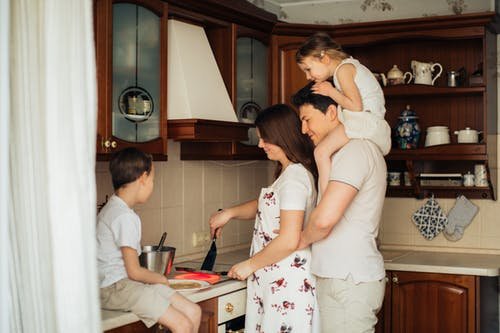Love in a time of COVID-19: families and couple relationships
“Working couples ordinarily spend only about 150 minutes together per day, while awake; 50 minutes of this time is spent watching TV.
Watching television together can be seen as a positive relationship practice but when television and online platforms become the mainstay of everyday life is this still true?
The Stay at Home message means that couples are now spending far more time together than they ever expected or perhaps wanted to.
When watching TV is the mainstay of family life is it still a welcome activity?
This could mean that couples are bonding over the box sets and adhering to exercise regimes that are proliferating online and on terrestrial TV, but the removal of routines and the ever-present four walls of the home also mean that people are living on top of each other.
Add children into the mix and households are feeling rather crowded and often fraught.
Television portrayals of “happy families” obscure the lives of women and children who feel unsafe at home and do not acknowledge the fear of being isolated at home with their perpetrator.
There are already indications that there has been a rise in the incidence of domestic abuse that is directly attributable to the Stay at Home guidance required to combat the coronavirus combined with necessary changes in the policing and management of victim and witness services.
“Nothing has been said about single people outside this age group”
The focus of media stories has been how families and parents are managing to juggle being at home and working lives or the adverse pressures of job insecurity and lack of income.
There have been necessary attention drawn to the ways that the older population is coping, in terms of health, practicalities and social isolation, especially those who live alone.
However, there has been nothing said about single people outside this age group and who live in single-person households. The number of people living alone in 2018 has now surpassed 8 million, and this increase is driven by middle-aged women (45 to 64 years) and older men (65 to 74 years).
Single people who are not ordinarily perceived as vulnerable under their age or health, and who may be otherwise self-reliant in their social networks, are nevertheless being adversely impacted by self-isolation and the Stay at Home guidelines.
Many are using personal networks, social media and MeetUp groups to sustain a sense of connectedness during these isolating times. Meeting up together online for drinks, chats, quizzes have helped to bridge the social gap and forge new connections.
Virtual date nights have become another way for single people to meet someone new. Others are feeling isolated and disconnected as the impact of the couple norm and focus on families comes home.
Non-judgemental attachment of humans and animals
Animals can have profound benefits for health and wellbeing, something that is especially important for older people and the non-judgmental attachment of human-animal bonds can help to combat the feelings of loneliness and isolation which routinely experienced by LGBTQ people.
In this way, it is the non-humanness – or otherness – which makes animals perfect companions for humans. In the UK, 45% of the population now owns a pet, an increase of 5% since 2016. 26% of UK households now include a dog – this equates to nine million dogs.
While it is “family” households that have seen the steepest increase in dog ownership, there is also a notable increase in the number of pets within childfree. The decision to bring a dog into a relationship is perceived as a sign of couple stability, testing out the human bond and bestowing futurity to the related project.
Human-animal connections are providing a much-needed source of comfort
One of the few exceptions to the Stay at Home guidance is exercise and dog walking. Notwithstanding quips around #pimpmydog and hitherto one-short-walk routines being extended to long schleps across the countryside and parks, many pooches are now getting more exercise than ever before.
This reconnection with nature may yet instill an appreciation of nature that has lasting benefits for the mind, body, and soul.
Behind closed doors, for many single people, human-animal connections are providing a much-needed source of comfort and companionship that may help to sustain them over periods of social and/or self-isolation.
